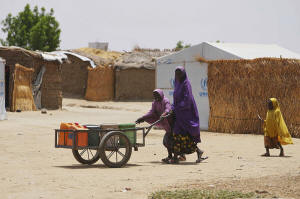|
The community, very close to the border of Chad, is about 270
kilometers (167 miles) from Maiduguri, Borno’s capital city.
The governor, represented by Sugun Mai Mele, the commissioner
for local governments, visited the community and warned
residents against collaborating with Boko Haram militants.
“Anyone found collaborating with the insurgents to bring harm or
attack to the people of Malam Fatori will be cursed,” he said,
adding that there are measures being put in place to fortify the
town against future attacks.
A resurgence of Boko Haram attacks has been shaking Nigeria’s
northeast in recent months, as Islamic extremists have
repeatedly overrun military outposts, mined roads with bombs and
raided civilian communities, raising fears of a possible return
to peak Boko Haram-era insecurity despite the military’s claims
of successes.
Last month, a suicide bomber suspected to be female killed at
least 10 people and injured several others in an explosion in a
restaurant in the Konduga area of Borno, as the state struggles
to curb attacks by the extremists.
Boko Haram, Nigeria’s homegrown jihadis, took up arms in 2009 to
fight Western education and impose their radical version of
Islamic law. The conflict also has spilled into Nigeria’s
northern neighbors.
Some 35,000 civilians have been killed and more than 2 million
displaced in Nigeria's northeastern region, according to the
U.N.
Apart from the insurgency in the northeast, Africa’s most
populous country is also facing serious security challenges in
the north-central and northwest regions, where hundreds have
been killed and injured in recent months.
All contents © copyright 2025 Associated Press. All rights
reserved |
|




